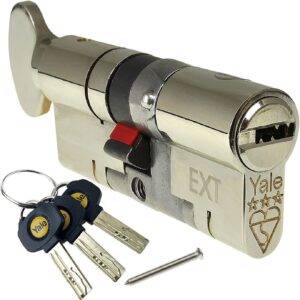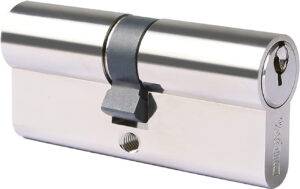Locks and humanity’s need for security have been around for thousands of years, with the earliest known examples dating back to ancient Egypt and Mesopotamia. The early locks were simply designed and were made of wood or metal, normally using a pin or bolt to prevent the lock from opening. Over time, locks became a lot more sophisticated, with the development of keys and more advanced locking mechanisms. Today, locks are used in a wide variety of applications, from securing buildings and homes to protecting sensitive information and valuable possessions.
It is difficult to say which lock is the most famous, as there have been many notable locks throughout history. Some of the most famous locks include the locks at the Tower of London. Additionally, the iconic padlock used on the Brooklyn Bridge in New York City is also well-known. Ultimately, the most famous lock may depend on the individual and their personal knowledge and experiences.
There are many brands of locks that are known for their quality and reliability. Some of the most well-known brands include Yale, Schlage, Kwikset, and Medeco. These brands offer a wide range of locks for different applications, including residential, commercial, and industrial settings. When choosing a lock, it is important to consider the level of security that is needed and to select a brand that has a reputation for durability and reliability.
 Yale is a well-known brand of locks and other security products. The company was founded in the early 19th century by Linus Yale Sr., who developed a new type of lock based on the principles of the Egyptian pin tumbler lock. Yale’s design was more secure and durable than other locks of the time, and it quickly became popular. Now days the company continued to innovate and expand, and today it offers a wide range of security products, including locks, safes, and other security systems. Yale is known for its commitment to innovation and quality, and its products are used in homes, businesses, and other settings around the world.
Yale is a well-known brand of locks and other security products. The company was founded in the early 19th century by Linus Yale Sr., who developed a new type of lock based on the principles of the Egyptian pin tumbler lock. Yale’s design was more secure and durable than other locks of the time, and it quickly became popular. Now days the company continued to innovate and expand, and today it offers a wide range of security products, including locks, safes, and other security systems. Yale is known for its commitment to innovation and quality, and its products are used in homes, businesses, and other settings around the world.
Schlage is a brand of locks and other security products. The company was founded in 1920 by Walter Schlage, who invented the cylindrical lock, which became the industry standard for locking mechanisms. Over the years, Schlage has continued to innovate and expand its product line, and today it offers a wide range of security products for residential, commercial, and industrial applications. Schlage is known for its commitment to quality and durability, and its products are used in homes and businesses around the world.
Kwikset is a brand of locks and other security products. The company was founded in 1946 by Karl Rhinehart, who developed the first mass-produced tubular pin tumbler lock. Kwikset’s innovative design was more secure and easier to use than other locks of the time, and it quickly became popular. Kwikset has continued to innovate and expand its product line, and today it offers a wide range of security products for residential, commercial, and industrial applications. Kwikset is known for its commitment to quality and affordability, and its products are used in homes and businesses around the world.
Medeco is a brand of locks and other security products. The company was founded in 1968 by Bill Creswell and Barry Gresham, who developed a new type of high-security lock based on the principles of the pin tumbler lock. Medeco’s innovative design used rotating pins to create a unique key pattern, making the locks virtually pick-proof. Over the years, Medeco has continued to innovate and expand its product line, and today it offers a wide range of security products for residential, commercial, and industrial applications. Medeco is known for its commitment to security and quality, and its products are used in homes and businesses around the world.
We continue to relay on locks, as different people may have different levels of reliance on locks for their security. Some homeowners may use locks extensively to secure their homes, while others may use them less frequently or not at all. Additionally, the level of reliance on locks may vary depending on the individual’s location, personal security concerns, and the type of lock that they use. Ultimately, the level of reliance on locks may vary greatly among homeowners.
There are several steps that can be taken to help preserve and prolong the life of an average lock. These steps include:
- Regularly lubricating the lock with a high-quality lubricant. This can help reduce friction and wear on the lock’s internal components, and it can also make the lock easier to operate.
- Avoiding exposing the lock to extreme temperatures or harsh weather conditions. This can cause the lock to become damaged or corroded, reducing its lifespan.
- Regularly inspect the lock for signs of damage or wear. This can help identify any potential problems with the lock before they become serious.
- Avoiding using excessive force when operating the lock. This can cause damage to the lock’s internal components, reducing its lifespan.
- Storing the lock in a dry, secure location when it is not in use. This can help protect the lock from damage or theft.
It is generally quite easy to copy most types of keys. There are many businesses and services that offer key duplication services, and most of them are able to duplicate a wide range of keys quickly and inexpensively. Additionally, there are many key copying machines that can be used to make copies of keys, and these machines are widely available at hardware stores, home improvement centres, and other retail locations. However, some keys may be more difficult to duplicate, depending on their design and security features. High-security keys, for example, are more difficult to copy due to their unique design and specialized cutting machines that are needed to duplicate them.
copy most types of keys. There are many businesses and services that offer key duplication services, and most of them are able to duplicate a wide range of keys quickly and inexpensively. Additionally, there are many key copying machines that can be used to make copies of keys, and these machines are widely available at hardware stores, home improvement centres, and other retail locations. However, some keys may be more difficult to duplicate, depending on their design and security features. High-security keys, for example, are more difficult to copy due to their unique design and specialized cutting machines that are needed to duplicate them.
Locks have become more sophisticated in the last 100 years, as the field of lock technology has continued to evolve and advance. In the early 20th century, locks were primarily mechanical and relied on simple mechanisms, such as pins or bolts, to prevent the lock from opening. However, over time, locks have become more complex and incorporate advanced technologies, such as electronic components, to provide enhanced security and convenience. Today, there are many different types of locks available, including keyless entry systems, smart locks, and biometric locks, which use fingerprints or other personal characteristics to grant access. These advanced locks offer a higher level of security and convenience than the locks of the past.
Smart locks are a type of electronic lock that can be controlled and accessed remotely using a smartphone or other device. These locks typically use Bluetooth or other wireless technologies to communicate with the user’s device, allowing them to unlock the door by entering a code or using a fingerprint or other biometric data. Smart locks are becoming increasingly popular because they offer a higher level of security and convenience than traditional mechanical locks. Additionally, many smart locks are designed to be easily installed on existing doors, making them a convenient and cost-effective option for homeowners who want to upgrade their security.
